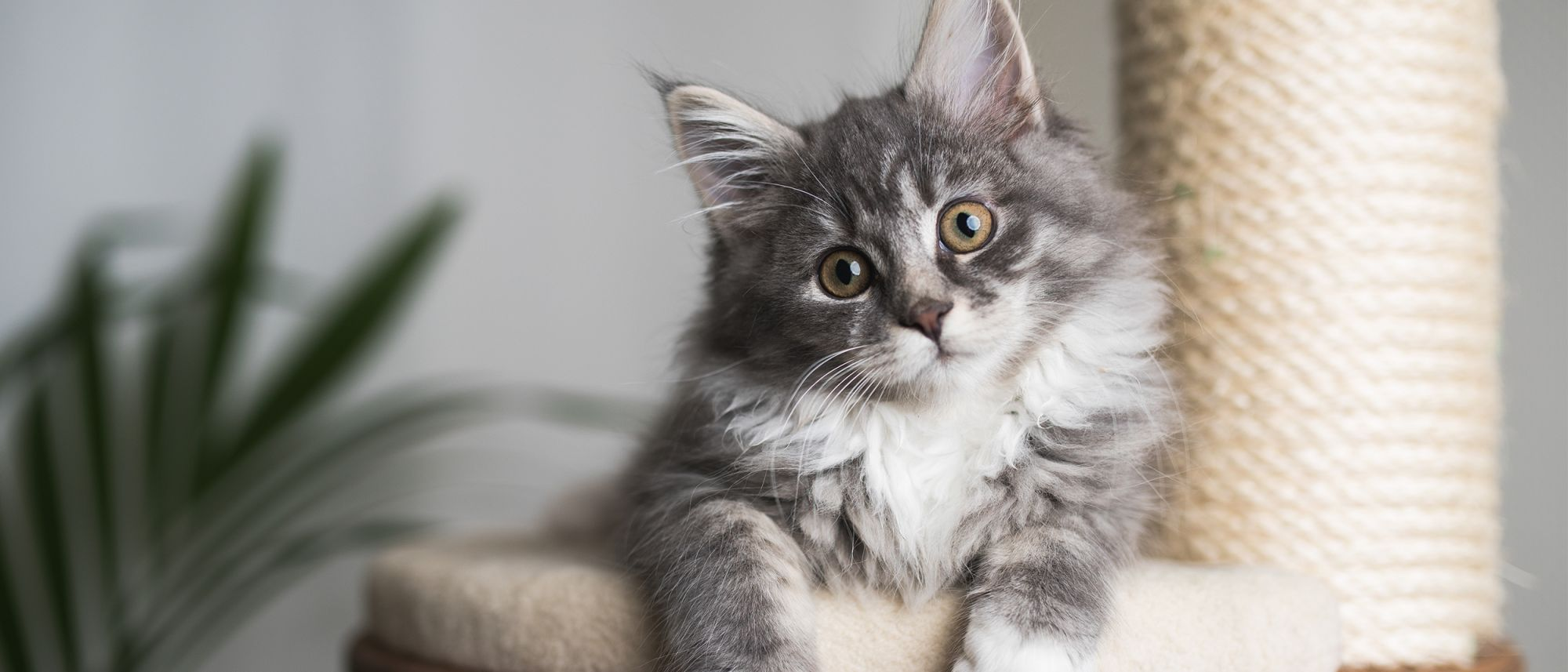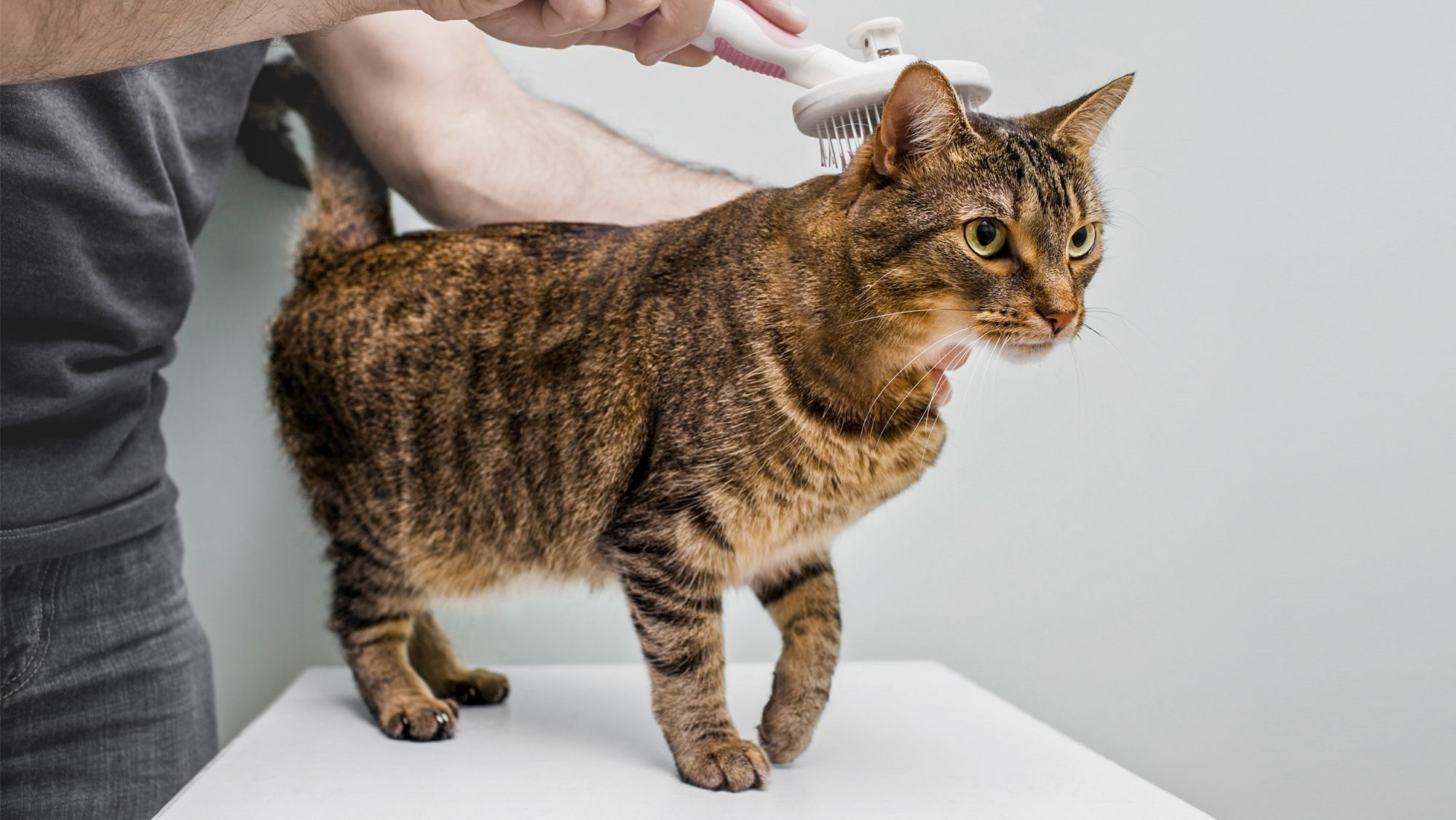Cách chăm sóc mèo hoặc mèo con

Đồ dùng quan trọng
Khi lần đầu mang mèo về nhà, bạn sẽ cần những đồ dùng cơ bản. Đó là:
- Giỏ: Điều này có nghĩa là lớp lót dễ chịu sẽ giúp mèo con cảm thấy thoải mái và an toàn. Không để giỏ ở dưới đất, tốt nhất là đặt giỏ ở nơi mà mèo con cảm thấy an toàn, tránh xa khu vực có gió lùa hoặc có quá nhiều người qua lại.
- Hộp vệ sinh: Hộp vệ sinh cần sâu vừa đủ và có một chiếc xẻng nhỏ để sàng lọc phân, nhưng cũng không được quá sâu vì như vậy mèo con sẽ không dùng.
- Bát đựng nước: Luôn để sẵn một bát nước lọc cho mèo. Bạn có thể dùng đài phun nước uống thay cho bát vì mèo rất thích những thứ chuyển động. Đồng thời, đài phun nước uống khuyến khích mèo uống nhiều nước hơn.
- Bát đựng thức ăn: Bạn cần dùng một bát nhỏ để đựng thức ăn hạt, đặt xa bát đựng nước uống để bát không bị bẩn. Ngoài ra, bạn cũng có thể cho mèo chơi đồ chơi giải đố để lấy đồ ăn. Đặc biệt, nếu chú mèo của bạn là mèo sống trong nhà, món đồ chơi này sẽ kích thích tinh thần và thể chất, thỏa mãn bản năng săn mồi tự nhiên của chúng. Mèo con cần giai đoạn chuyển tiếp để học cách dùng món đồ chơi này.
- Nhà cây cho mèo: Một món phụ kiện vừa thú vị vừa hữu ích cho mèo để chúng cào, leo trèo và ẩn nấp một cách an toàn. Ngoài ra, phụ kiện này còn giúp mèo thể hiện bản năng tự nhiên nên góp phần mang lại sức khỏe tích cực cho mèo.
Với mỗi món đồ, bạn nên mua 2 chiếc trở lên và đặt quanh nhà để chú mèo mới có thể lựa chọn, đồng thời cho chúng cơ hội tìm không gian yên tĩnh, không phải gặp khách hoặc tránh nơi tiếng ồn lớn nếu chúng muốn.
Môi trường
Môi trường là một phần quan trọng đối với sức khỏe và cuộc sống khỏe mạnh của mèo. Môi trường thuận lợi là nơi mà mèo có thể hòa nhập xã hội một cách an toàn mà không phải đối mặt với quá nhiều vấn đề. Môi trường đó sẽ giúp mèo quen với mọi người và mọi thứ xung quanh.
Ngay từ khi còn rất nhỏ, mèo sẽ bắt đầu tổ chức và đánh dấu lãnh thổ. Đây là nơi mèo sẽ ngủ, vui chơi, săn mồi, ăn uống, ẩn náu, leo trèo và được âu yếm. Trong nhà, mèo sẽ sắp xếp cuộc sống của chúng xung quanh bốn khu vực khác nhau. Bạn cần tôn trọng các khu vực đó để mèo không gặp các vấn đề rối loạn hành vi, đặc biệt là đối với những chú mèo sống trong nhà.
- Khu vực cho ăn: Khu vực này phải yên tĩnh, cách xa hộp vệ sinh và khu vực ăn uống của bạn. Tốt hơn hết là bạn nên tránh dùng phòng ăn hoặc những khu vực mà mèo có thể bị quấy rầy làm khu vực cho ăn để mèo có nhiều không gian khi ăn uống.
- Khu vực nghỉ ngơi: Mèo sẽ thay đổi nơi nghỉ ngơi trong ngày tùy thuộc vào ánh sáng mặt trời và nguồn nhiệt. Về bản chất, mèo thích ngủ ở nơi cao ráo và thường chọn vị trí phù hợp nhất. Vì vậy, hãy nhớ chừa nhiều không gian trống để mèo có thể lựa chọn.
- Khu vực vệ sinh: Hộp vệ sinh phải ở nơi yên tĩnh, ở nơi mèo có thể thường xuyên lui tới, cách xa bát ăn và nơi có nhiều người qua lại. Hãy thận trọng để tránh mọi loại căng thẳng: đã từng có một số trường hợp mèo bị bẩn vì hộp vệ sinh được đặt ở bên cạnh máy giặt. Bạn nên dùng ít nhất 1 khay vệ sinh cho mỗi chú mèo và 1 khay vệ sinh dự phòng để chúng có nhiều lựa chọn và tránh gặp phải những vấn đề này.
- Khu vực chơi đùa: Đây là không gian sống và là nơi thư giãn rộng nhất của mèo. Đây phải là nơi mèo có thể chạy quanh, ẩn nấp hoặc ở trên cao. Nhà cây cho mèo là phụ kiện tuyệt vời để khuyến khích hoạt động này và hỗ trợ sức khỏe cũng như cuộc sống khỏe mạnh của mèo.
Tập thể dục
Mèo sống trong nhà cần vận động nhiều để kích thích thể chất và tinh thần. Điều đó có nghĩa là:
- Nhiều đồ chơi; hãy cho mèo chơi nhiều đồ chơi luân phiên nhau để mèo luôn thích thú, những đồ chơi để leo trèo và ẩn nấp, đồng thời hàng ngày cho chúng thời gian thường xuyên vui chơi bên gia đình
- Do chải lông nhiều hơn và thường ít vận động hơn, mèo sống trong nhà, đặc biệt là mèo lông dài, cần chế độ ăn uống có thể phòng ngừa bệnh búi lông và tương ứng mức độ vận động thấp
- Bạn không muốn mèo để lại những vết cào trên đồ đạc hoặc tường nhà. Tuy nhiên, gãi ngứa là một hành vi tự nhiên. Bạn cần cho mèo nơi để chúng thực hiện hành vi này. Lên kế hoạch mua ít nhất 1 trụ cào móng
Cho ăn
Đối với mèo nhà, lượng thức ăn phụ thuộc vào một số yếu tố. Mèo thích ăn trong không gian yên tĩnh, xa tầm nhìn và động vật ăn thịt, có lối thoát không có trở ngại.
Chỉ những thức ăn chất lượng cao, được chế biến đặc biệt dành cho mèo mới có thể đảm bảo cung cấp tất cả các chất dinh dưỡng cần thiết để mèo luôn khỏe mạnh, bất kể độ tuổi, giống, lối sống hoặc mức độ nhạy cảm.
- Mặc dù có quyền lựa chọn nhiều chế độ ăn uống, nhưng nếu bạn thường xuyên và liên tục thay đổi chế độ ăn uống của mèo, hoạt động tiêu hóa của chúng sẽ bị ảnh hưởng
- Đồ chơi giải đố để lấy đồ ăn là một cách tuyệt vời để giải tỏa tinh thần cho mèo và khuyến khích chúng vận động để lấy thức ăn và thực hiện bản năng săn mồi
- Hành vi săn mồi đóng vai trò quan trọng trong cách ăn của mèo. Đó là lý do tại sao mèo thường ăn nhiều bữa nhỏ trong ngày, thay vì ăn 1 hoặc 2 bữa lớn
- Mèo cần rất nhiều protein có một số axit amin thiết yếu. Một trong những axit amin thiết yếu đó có taurine, chỉ có ở mô động vật trong tự nhiên
- Chất béo là nguồn năng lượng quan trọng đối với mèo, có tỷ lệ calo hàng ngày do lượng chất béo cung cấp nhiều hơn lượng calo khuyến nghị cho con người
- Mèo cũng cần vitamin và khoáng chất rất đặc biệt như vitamin D mà chúng chỉ có thể nhận từ chế độ ăn uống
- Ở giai đoạn sơ sinh, đường tiêu hóa của mèo con hoàn toàn phù hợp để tiêu hóa sữa công thức dành cho mèo con. Tuy nhiên, khả năng tiêu hóa của mèo sẽ thay đổi và sẽ không thể tiêu hóa được lactose nữa khi ở giai đoạn trưởng thành.

Cắt tỉa lông móng
Khi bạn chải lông cho mèo, bộ lông của mèo không chỉ trông đẹp mà còn chứa ít lông rụng hơn, điều này đồng nghĩa với việc mèo sẽ phải loại bỏ ít lông rụng hơn khi tự chải chuốt. Điều này mang lại lợi ích vì hoạt động chải chuốt chiếm trung bình 30% thời gian của mèo, khiến mèo nuốt phải lông rụng, do đó dẫn đến búi lông và đôi khi là cả vấn đề về tiêu hóa.
- Các giống mèo lông dài, chẳng hạn như mèo Ba Tư, cần được gỡ rối bộ lông cẩn thận bằng một chiếc lược chất lượng tốt mỗi ngày.
- Với những chú mèo có bộ lông ngắn và phẳng (chẳng hạn như mèo Xiêm hoặc mèo Abyssinia), đôi khi chỉ cần dùng tay vuốt mạnh một vài lượt là đủ.
- Đối với mèo có bộ lông có dài vừa hoặc có lớp lông tơ dày (chẳng hạn như mèo Maine Coon hoặc mèo Ba Tư lông ngắn), nên dùng bàn chải lông mềm để chải lông mỗi tuần một lần.
Răng miệng
Sức khỏe răng miệng tốt bắt đầu từ khi mèo con còn nhỏ.
- Khi về nhà, mèo con vẫn còn răng sữa. Những chiếc răng sữa này khá mỏng manh, vì vậy thức ăn hạt cần phải mềm hơn và dễ vỡ hơn so với cho mèo lớn tuổi.
- Một số loại thức ăn ướt có công thức đặc biệt dành cho mèo con với kết cấu tuyệt vời, phù hợp với hàm răng nhạy cảm của mèo con
- Đánh răng là tiêu chuẩn vàng đối với chăm sóc răng miệng và bạn nên sử dụng bàn chải đánh răng chuyên dụng cho mèo cùng với kem đánh răng thú y.
Sức khỏe
Sức khỏe và cuộc sống khỏe mạnh của mèo liên quan đến nhiều yếu tố, từ tiêm vắc-xin dự phòng cũng như thuốc uống cho đến bảo hiểm và thậm chí là có triệt sản cho thú cưng hay không. Một số những chi phí này là tách biệt còn một số khác, cùng với chế độ dinh dưỡng và cắt tỉa lông móng, cần được tính vào ngân sách liên tục.
- Mèo được tiêm vắc-xin định kỳ để phòng vi-rút gây bệnh giảm bạch cầu ở mèo, vi-rút herpes ở mèo và vi-rút calici ở mèo. Loạt tiêm vắc-xin này bao gồm hai mũi tiêm cách nhau từ ba đến bốn tuần. Chú mèo của bạn có thể đã được tiêm mũi đầu tiên trước khi về với bạn vì liều đầu tiên có thể được tiêm khi mèo được khoảng chín tuần tuổi
- Gắn vi mạch là việc đặt một vi mạch bên dưới da cổ mà không gây đau và nhờ đó, bất kỳ bác sỹ thú y hoặc tổ chức cứu hộ nào cũng “đọc” được con chip bằng máy quét cầm tay. Bác sỹ thú y có thể thực hiện thủ thuật này tại bất kỳ cuộc hẹn khám định kỳ nào của bạn
- Điều quan trọng là phải tránh để chú mèo của bạn bị bọ chét, giun sán hoặc ve. Một người lai giống giỏi sẽ bắt đầu liệu trình diệt ký sinh trùng ngay từ khi mèo mới ra đời và hầu hết các trung tâm cứu hộ cũng sẽ bắt đầu một chế độ tẩy giun sán và điều trị bọ chét hợp lý cho tất cả các con vật mà họ chăm sóc. Điều quan trọng là bạn phải hỏi người đang bàn giao mèo cho bạn về những biện pháp điều trị mà chú mè mới của bạn đã trải qua trước kia
- Triệt sản là một trong những quyết định có trách nhiệm nhất mà bất kỳ chủ vật nuôi nào cũng có thể đưa ra. Mèo thường được triệt sản vào thời điểm bất kỳ sau khi được khoảng sáu tháng tuổi
- Điều quan trọng là phải sắp xếp các buổi kiểm tra sức khỏe hàng năm với bác sỹ thú y để giúp ngăn ngừa mọi vấn đề sức khỏe và theo dõi những thay đổi về trọng lượng và hành vi
Huấn luyện
Phần lớn quá trình học hỏi của mèo con diễn ra trong sáu tháng đầu đời. Hầu hết hành vi có được trong ba tháng tuổi đầu tiên chủ yếu là học được từ mèo mẹ và mèo con cùng lứa.
Điều đó có nghĩa là khi bạn đưa mèo về nhà, bạn chỉ đóng góp một phần rất nhỏ vào việc học hỏi cơ bản của mèo, nhưng bạn vẫn có trách nhiệm trong đó. Nhiệm vụ của bạn là hoàn thành việc huấn luyện cho mèo trong môi trường mới và giải quyết các hành vi không mong muốn.
Bảo hiểm
Bảo hiểm mang đến sự an tâm rằng bạn có thể cung cấp sự chăm sóc mà mèo cần nếu xảy ra khủng hoảng.
Các công ty bảo hiểm thú cưng cung cấp nhiều mức bảo hiểm đa dạng và mức giá thay đổi tùy theo độ tuổi, giống hoặc kích thước và loại mèo, cũng như nơi sống của bạn.
Tìm gói bảo hiểm phù hợp với bạn và mèo con bằng cách:
- Sử dụng Internet để so sánh các gói
- Hỏi bác sỹ thú y
- Tìm trên tạp chí thú cưng
Ban đầu, việc chuẩn bị mọi thứ cần thiết để chăm sóc cho mèo hoặc mèo con có thể hơi quá sức. Tuy nhiên, bằng việc bắt đầu đúng cách, bạn sẽ giúp chú mèo thích nghi với ngôi nhà mới và duy trì cuộc sống vui vẻ, khỏe mạnh.
Tìm hiểu thêm về các giống mèo

Thích và chia sẻ trang này